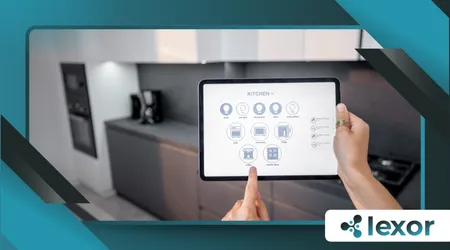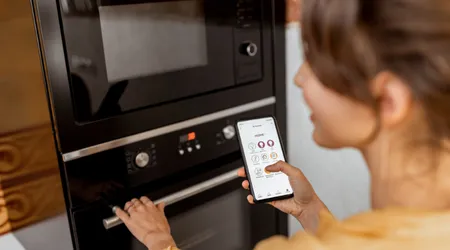Connected Kitchen: Smart Appliances Worth Investing In

The modern kitchen is no longer just a place to cook; it’s a hub of innovation where smart appliances are transforming how we prepare, store, and enjoy food.
From refrigerators that remind you to buy milk to ovens that preheat themselves, these devices are redefining convenience and efficiency.
But with so many options on the market, which ones are truly worth the investment?
Let’s explore the cutting-edge world of connected kitchens and uncover the must-have gadgets that can elevate your culinary experience.
The Rise of the Connected Kitchen
The concept of a connected kitchen has gained momentum in recent years, driven by advancements in IoT (Internet of Things) and AI technologies.
According to a 2023 report by Statista, the global market for smart appliances is projected to reach $96.6 billion by 2027, reflecting a growing demand for intelligent home solutions.
This surge isn’t just about luxury; it’s about practicality.
Smart devices are designed to save time, reduce energy consumption, and simplify daily tasks, making them an attractive option for busy households.
The convenience of being able to control your kitchen appliances from anywhere is a game-changer.
You can start your oven while on your way home from work or check the contents of your fridge while grocery shopping.
But what exactly makes an appliance “smart”?
At its core, a smart device connects to your home network, allowing you to control it remotely via a smartphone app or voice assistant.
Many also feature AI-driven capabilities, such as learning your preferences or automating repetitive tasks.
The result? A kitchen that works smarter, not harder.
This interconnectivity can also lead to improved energy efficiency, as many smart appliances can optimize their operation based on real-time data.
+ Smart Lighting Systems: Complete Installation Guide
Must-Have Smart Appliances for Your Kitchen
1. Smart Refrigerators: The Brain of Your Kitchen
Imagine a refrigerator that tracks expiration dates, suggests recipes based on available ingredients, and even lets you peek inside remotely via a built-in camera.
Smart refrigerators, like Samsung’s Family Hub or LG’s InstaView, offer these features and more.
They’re not just cool (pun intended); they’re practical.
For instance, if you’re at the grocery store and can’t remember if you need eggs, simply check the app to see inside your fridge.
Additionally, many smart refrigerators come equipped with touchscreens that allow you to create shopping lists or display family calendars.
This central hub functionality can streamline your kitchen activities and keep your family organized.
Table 1: Comparison of Top Smart Refrigerators
| Model | Key Features | Price Range |
|---|---|---|
| Samsung Family Hub | Built-in cameras, recipe suggestions | $3,000 – $4,000 |
| LG InstaView | Knock-to-see feature, voice control | $2,500 – $3,500 |
| Bosch 800 Series | Wi-Fi connectivity, energy-efficient | $2,000 – $3,000 |
2. Smart Ovens: Precision Cooking at Your Fingertips
Gone are the days of guessing oven temperatures or burning your dinner.
Smart ovens, such as the June Oven or GE Profile, use AI to recognize food and adjust cooking settings automatically.
Some even come with built-in cameras, so you can monitor your roast without opening the door.
These appliances are perfect for home chefs who want restaurant-quality results without the hassle.
Moreover, many smart ovens offer recipe integration, allowing you to follow along with step-by-step instructions directly from the oven’s display.
This feature can help even novice cooks achieve impressive results with minimal effort.

3. Smart Dishwashers: Efficiency Meets Sustainability
Modern dishwashers are no longer just about cleaning dishes; they’re about doing it efficiently.
Models like the Bosch 800 Series or Whirlpool Smart Countertop Dishwasher connect to your phone, allowing you to start or monitor cycles remotely.
They also use sensors to optimize water and energy usage, making them a win for both convenience and sustainability.
With features like delay start and cycle customization, you can run your dishwasher during off-peak hours to save even more on your utility bills.
Additionally, many smart dishwashers provide maintenance alerts, letting you know when it’s time to clean filters or perform other upkeep tasks.
Table 2: Energy Savings of Smart Dishwashers
| Model | Annual Energy Savings | Water Savings per Cycle |
|---|---|---|
| Bosch 800 Series | 15% | 2 gallons |
| Whirlpool Smart Countertop | 10% | 1.5 gallons |
4. Smart Coffee Makers: Your Personal Barista
For coffee enthusiasts, a smart coffee maker is a game-changer.
Devices like the Behmor Connected Brewer or Smarter’s Wi-Fi Coffee Machine let you schedule brews, adjust strength, and even reorder beans when you’re running low.
Imagine waking up to the aroma of freshly brewed coffee every morning—without lifting a finger.
Some models even allow you to customize your brew through an app, ensuring that you get the perfect cup every time.
This level of control can elevate your morning routine and make every coffee break feel special.
The Argument for Investing in Smart Appliances
While the upfront cost of smart appliances can be higher than traditional models, the long-term benefits often justify the investment.
For starters, they save time.
A smart oven that preheats itself or a dishwasher that starts with a voice command can shave precious minutes off your daily routine.
This time savings can be particularly valuable for busy families juggling multiple schedules.
Additionally, many smart appliances offer features that help you manage your kitchen more efficiently, such as inventory tracking and automated shopping lists.
Secondly, they promote sustainability.
Many smart devices are designed to minimize energy and water usage, which not only reduces your utility bills but also benefits the environment.
For example, smart refrigerators often come with energy-saving modes, while smart dishwashers optimize water usage based on load size.
By investing in these appliances, you contribute to a more sustainable future while enjoying the practical benefits they provide.
Finally, they enhance convenience.
Whether it’s a coffee maker that brews your favorite blend at 7 a.m. sharp or a refrigerator that sends you a shopping list, these appliances are designed to make life easier.
With the ability to control your kitchen from your smartphone, you can manage your cooking and cleaning tasks even when you’re not home.
This level of convenience can significantly improve your overall kitchen experience.

Addressing the Skeptics
Of course, not everyone is convinced.
Critics argue that smart appliances are overpriced and prone to technical glitches.
While it’s true that these devices can be more expensive, prices have been steadily decreasing as technology becomes more accessible.
Moreover, as competition in the market increases, manufacturers are continually improving their offerings to enhance reliability and user experience.
As for reliability, most reputable brands offer robust warranties and customer support to address any issues.
This support can provide peace of mind, knowing that help is available if you encounter problems.
Another common concern is privacy.
After all, a connected kitchen means more data being shared online.
However, manufacturers are increasingly prioritizing security features, such as encryption and secure login protocols, to protect user information.
Staying informed about privacy settings and regularly updating your devices can further enhance your security.
Consumers can enjoy the benefits of smart technology while minimizing risks by taking proactive steps.
++ Smart Home Essentials: Complete Setup Guide 2025
The Future of Smart Kitchens
The connected kitchen is just the beginning.
As AI and IoT technologies continue to evolve, we can expect even more innovative features.
Imagine a refrigerator that orders groceries for you or an oven that streams cooking tutorials directly to its display.
These advancements could revolutionize our cooking experiences and further integrate technology into our daily lives.
The possibilities are endless, and the future of cooking is looking smarter than ever.
As smart kitchens evolve, we may also see enhanced interconnectivity between appliances, allowing them to work together seamlessly for a more efficient cooking process.
Conclusion
Investing in smart appliances is more than just a trend; it’s a step toward a more efficient, sustainable, and enjoyable kitchen experience.
While the initial cost may seem daunting, the long-term benefits—time savings, energy efficiency, and unparalleled convenience—make them a worthwhile addition to any modern home.
So, whether you’re a tech enthusiast or a busy parent looking to simplify your routine, it’s time to embrace the connected kitchen revolution.
By choosing the right smart appliances, you’re not just upgrading your kitchen—you’re transforming the way you live.
And in a world where time is the most valuable resource, that’s an investment worth making.
With the right tools, you can create a kitchen that not only meets your needs but also enhances your overall quality of life.
